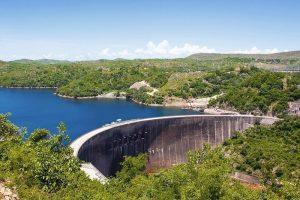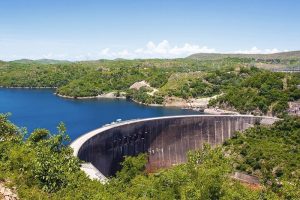Zimbabwe power outages hit businesses and families
(BBC) It is after 10 o’clock at night, and Zimbabwe’s capital Harare is uncharacteristically dark.
Chatter and laughter emerge from a small factory inside the Willowvale Industrial Park.
Men in overalls sit around a small fire under the moonlight, waiting for the few hours of power so they can work.
Outages are normal in Zimbabwe, but rarely are they this severe.
“There is no schedule – yesterday we got it at 10 past 10 but it is passed that time now,” George Sadziwa told the BBC, as he walked around his power-hungry metal fabrication machines. His company Geosad Engineering has orders to make ore grinding mills, fuel and gas storage tanks, but he is worried they could fail to meet the delivery dates.
“Electricity is very essential in our business… From what the government officials are saying we hope this [situation] should turn around soon. If it doesn’t it will be a disaster.”
A phone call to the power utility confirms that there is no schedule for the return of the electricity. He is told to expect the power between 11pm and midnight.
Some of his business colleagues have started working at night too, said Mr Sadziwa. Ordinary Zimbabweans are also being forced to change their schedules, to wake up at midnight to iron their clothes, to use electric appliances and to catch up on the World Cup matches.
Zimbabwe has sunk about $2bn (£1.6bn) into power generation in the last decade. But the country still struggles with outages.
The crisis came to a head in the last fortnight, when the Zambezi River Authority ordered Zimbabwe’s Kariba South power station to shut due to dangerously low water levels in Lake Kariba.

Experts say the country’s coal-powered thermal plants are supposed to supply the baseload power, but the aged generators frequently break down. It has forced authorities to draw heavily on Kariba, exhausting the annual water allocation and eating into neighbouring Zambia’s share. Water levels were already low because of successive droughts.
The country is currently producing about 600 megawatts (MW) of power against a daily demand of about 2,000MW.
Zimbabwe plans to import 500MW of power from neighbouring Mozambique and Zambia, but crisis-hit South Africa is also competing for the same power to shore up its shortfall. Zimbabwe has already spent over US$1bn in imports over the last decade but financing for renewable energy remains low.
“Investors are not certain they will get their money out,” Mr Utedzi said. “There is a need to create conditions that have attracted financing that others in the region have.”
The government believes the problems are temporary and targets 3,500MW of power generation within the next two years. In the short-term it says one more unit at the Hwange thermal power station will be commissioned by the end of the year, adding 300MW to the grid, and that water levels are beginning to rise again at Kariba.
While these won’t end the power outages, Wella Chidziva hopes that it will enable the lights to be turned back on in time for Christmas.
The post Zimbabwe power outages hit businesses and families appeared first on .

